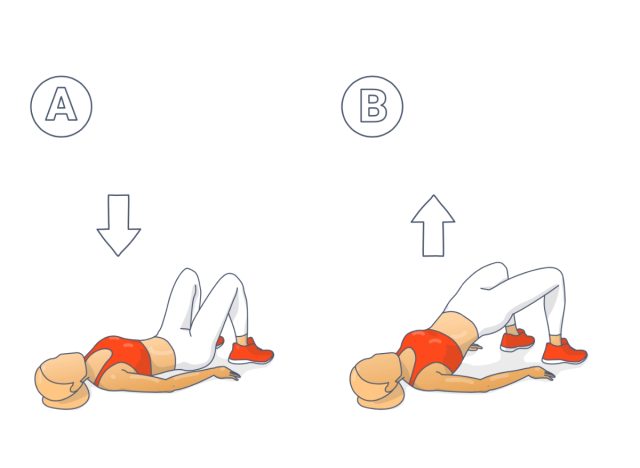The way you start your morning matters. Some people give a ton of thought to what they’re going to eat and drink as soon as they wake up, and others grab whatever is in front of them as they head out the door. Either way, what you put in your body for breakfast can impact your health in many ways, and dietitians say that some of the worst breakfast habits people commonly have can wreak havoc on your body and your health.
“Breakfast habits play a significant role in our overall health and well-being, and by recognizing and modifying these habits, we can positively impact our diets and enhance our overall health,” says Mary Sabat MS, RDN, LD. “Ensuring adequate water intake, reducing added sugar, incorporating protein-rich foods, and choosing healthier breakfast options can help establish a solid foundation for a nutritious and balanced diet.”
But what about the worst breakfast habits? Things like eating too much sugar, skipping out on fiber and protein, and avoiding breakfast altogether are habits that dietitians say we should limit if we want to start our day off on the right foot. Read on to learn more about the worst breakfast habits wreaking havoc on your healthy, and for more healthy eating tips, check out 9 Healthy Foods You Should Be Eating Every Day.
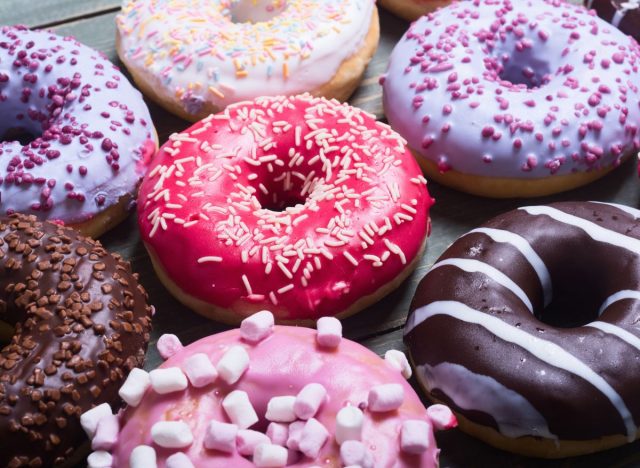

It can be tempting to grab a muffin on your way out the door or pull into the closest drive-thru for a donut and coffee on a busy day. But unfortunately, starting your day off with a lot of added sugar and no other nutrients is one of the worst breakfast habits you can adopt.
According to Melanie Betz MS, RD, CSR, CSG, we should limit these sugary breakfast items as much as possible. “Many traditional breakfast foods have a ton of added sugar, such as cereal, granola, breakfast pastries, muffins, pancakes, and waffles, as well sugar you may add to your coffee,” says Betz. “However, the American Heart Association recommends no more than 25 grams of added sugar for women and 36 grams for men to reduce the risk of heart disease, so it’s important to eat these sugary options sparingly.”
RELATED: The Worst Breakfast Habits for Inflammation, Say Dietitians


Breakfast is your first meal of the day, and it can be a great opportunity to get a few servings of fruit and vegetables, especially since “most people are nowhere near the goal of a minimum of five servings of fruits and vegetables per day,” says Betz. Meeting these goals is important for your overall health, as eating enough produce “can help reduce the risk of cancer, diabetes, heart disease, kidney disease, and even dementia.”
If you need some inspiration for how to make sure you’re getting enough fruits and veggies into your morning meal, “you can simply have a piece of fruit on the side of your dish, throw some bananas and berries in your cereal or oatmeal, or add peppers and onions to your eggs,” says Betz.
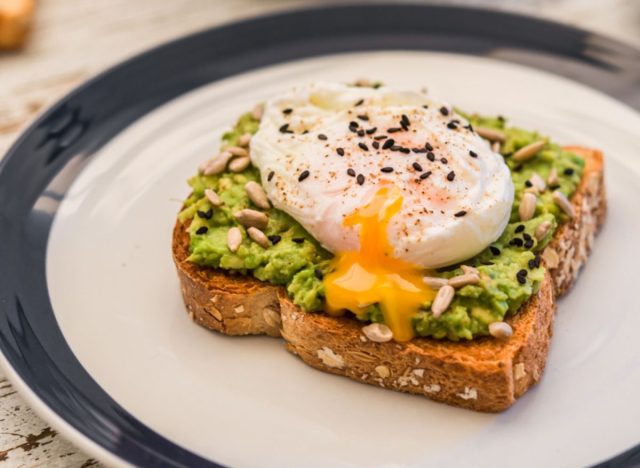

In a perfect world, you’d have enough time and energy every morning to make yourself a delicious vegetable omelet with turkey bacon and a cup of coffee to meet your protein and fiber goals. In reality, it can be really challenging to include enough vital nutrients in your breakfast—especially when you’re rushing to leave the house on time. However, not getting enough protein in your morning meal can be one of the worst breakfast habits to take on, according to dietitians.
“Breakfast is a time to think about getting enough protein because your muscle tissue gets broken down overnight when the body is in maintenance and repair mode, and you need protein to stimulate regrowth,” says Samantha Cassetty, MS, RD, nutrition advisor to Siggi’s and co-author of Sugar Shock. “So, if you don’t get it at breakfast, you’ve missed your chance until your next meal, and if you consistently miss this opportunity, your muscle mass will decline over time.”
Thankfully, there are plenty of quick and easy ways to throw some protein in your breakfast. Try adding protein powder to some Greek yogurt, making overnight oats with yogurt and protein powder, adding eggs to avocado toast, or making egg bites ahead of time that you can pop in the microwave the next morning.


Speaking of skipping breakfast, another potentially harmful breakfast habit is guzzling down coffee before you’ve had a chance to eat. In fact, a study published in the British Journal of Nutrition found that drinking coffee before breakfast can negatively impact your blood sugar levels.
Additionally, Jamie Nadeau, RD, claims that “coffee tends to dull your appetite, which means you’re more likely to skip or put off breakfast.”
“If you skip breakfast or wait too long to eat, you set yourself up to be too hungry and more likely to make irrational food choices,” she explains.
READ RELATED: 8 Easiest Daily Exercises for a Visibly Toned Six-Pack
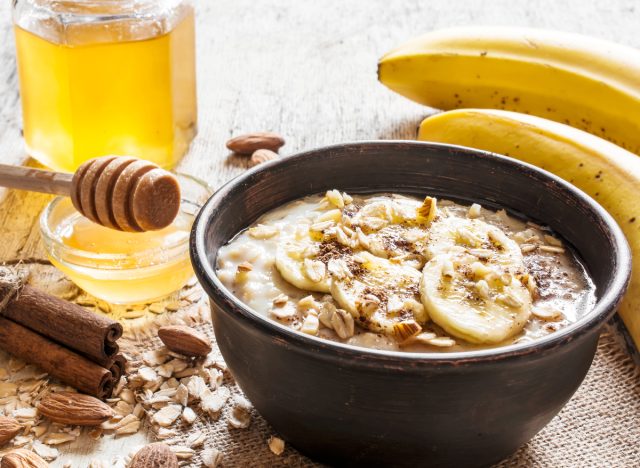

Another crucial nutrient to get enough of throughout your day is fiber, and starting with breakfast will ensure you can reach your goals by the end of the day. According to the Mayo Clinic’s recommendation, “Women should try to eat at least 21 to 25 grams of fiber a day, while men should aim for 30 to 38 grams a day.”
“Like protein, fiber helps to prevent a big blood sugar spike and crash from your meal,” says Nadeau.
Fiber also has long-term effects on reducing the risk of things like heart disease, type 2 diabetes, and certain cancers. With all of this in mind, Nadeau suggests incorporating “whole grain bread, oatmeal, chia seeds, flax seeds, avocado, berries, and veggies” into your regular breakfast routine.


Your mind may go straight to your morning cup of coffee as soon as you open your eyes, however, it’s important to also ensure you drink water before starting your day. Not drinking enough and becoming dehydrated can be detrimental to your health in the short and long term.
“Many people overlook the importance of hydrating their bodies in the morning, but failing to drink an adequate amount of water with breakfast can have negative consequences,” says Sabat. “Water helps maintain bodily functions, aids digestion, and supports nutrient absorption, and dehydration can lead to fatigue, lack of focus, and reduced metabolic efficiency.”
In order to help you remember to prioritize water in the morning, pour a glass full of water the night before and set it on your bedside table.
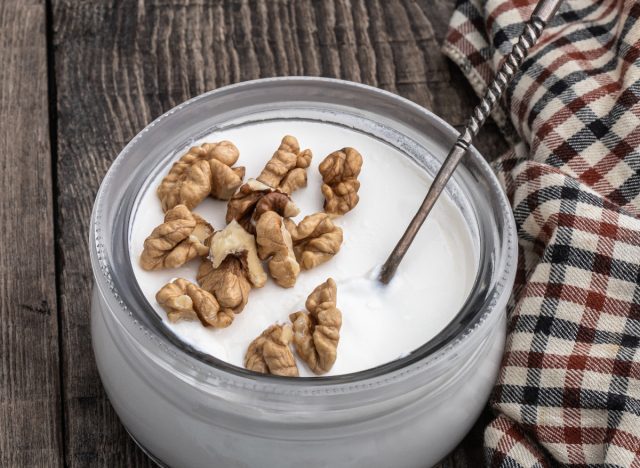

Another mistake you may be making with your breakfast routine is not considering the health of your gut. Having a healthy gut microbiome is important for digestion, immunity, and brain health, and eating gut-friendly foods can make a significant impact on how healthy it is.
When it comes to breakfast, Cassidy says, “A gut-friendly breakfast includes fiber-rich plant foods and fermented foods because fiber-rich foods contain prebiotics that feeds the beneficial bacteria in your gut, and fermented foods supply live and active cultures with probiotic activity.”
“I am for at least a fruit or veggie, a plant-based fat, and about 20 grams of protein,” advises Cassidy. “And for my healthy plant-based fat, I typically turn to walnuts. In fact, a 2018 study published in Nutrients found that eating walnuts was tied to positive changes in the gut microbiome.”


As far as breakfast habits go, skipping this meal altogether is one of the worst things you can do for your day.
“Starting your day with a high-protein, balanced breakfast helps you feel full, satisfied, and energized for the day, but many people who skip breakfast end up waiting too long to eat lunch, wind up feeling too hungry, and then overeat or make poor food choices,” says Nadeau. “Some research has also shown that eating breakfast may lower your risk of chronic disease.”



